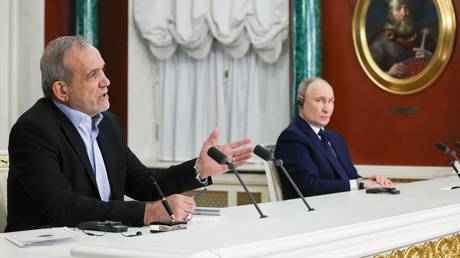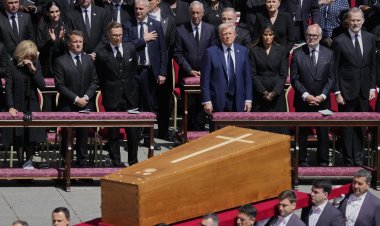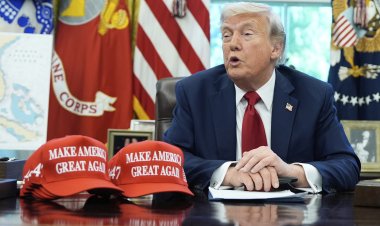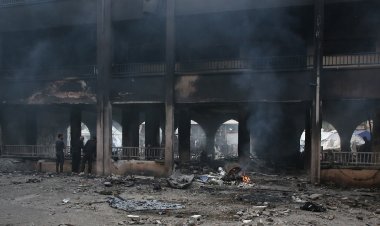Is a new alliance on the horizon? Here’s why everyone’s talking about the Russia-Iran deal
Moscow and Tehran have collaborated for years to secure a new agreement, but the key focus is on its potential effects on the global order moving forward.

Iranian President Masoud Pezeshkian’s trip to Moscow marked a significant development in the long-standing bilateral relations between Russia and Iran, which date back 400 years. A pivotal aspect of the visit was the signing of a strategic partnership agreement, reinforcing the enduring collaboration between the two nations while showcasing a deeper commitment to comprehensive cooperation on the global stage. This agreement reflects Tehran and Moscow’s dedication to jointly tackling global challenges and emphasizes their goal of enhancing collaboration in political, economic, and cultural arenas.
What’s included in the agreement?
The complete text of the comprehensive strategic partnership agreement, encompassing 47 provisions, has been made available on the official Kremlin website. Key aspects highlight the commitment of both countries to cultivate trade and economic cooperation across various mutual interests, along with plans for joint military exercises.
The agreement underscores that neither party will offer military or other forms of assistance to aggressors in the event of an attack on either nation. Additionally, Iran and Russia have resolved to prevent their territories from being utilized to support separatist movements that threaten territorial integrity. The two countries intend to collaborate closely on combating international terrorism and other threats while opposing unilateral coercive measures, which they perceive as breaches of international law.
It is crucial to note that the current agreement does not encompass military-technical cooperation, although it does not exclude the possibility of such arrangements in the future.
Moreover, the agreement commits both parties to work together on arms control and to ensure international security under the aegis of existing international treaties and organizations. This provision is of strategic importance, indicating Moscow’s and Tehran’s readiness to align their actions regarding global security, suggesting the potential for a full-fledged alliance in response to changing global dynamics.
The agreement places significant emphasis on economic interactions. Iran and Russia have pledged not to participate in sanctions imposed by third parties against one another, nor to impose unilateral coercive measures. There are plans to develop an independent payment infrastructure to reduce reliance on external nations, as well as to collaborate on peaceful nuclear energy projects, which include constructing nuclear power facilities.
A central goal of this agreement is to substantially increase trade between the two countries, which is particularly pertinent given their mutual interests and potential. For context, trade volume between Russia and Iran was merely $4.5 billion in 2024, whereas trade with Turkey surpassed $60 billion in recent years. This agreement is expected to foster a deeper understanding between the two countries.
To promote cultural and informational exchanges, both parties aim to enhance cooperation among their media outlets to combat disinformation and negative propaganda. They also plan to collaborate on disaster prevention and technological safety initiatives.
The agreement also includes plans for constructing a gas pipeline from Russia to Iran via Azerbaijan, alongside discussions on pricing strategies.
This 20-year pact emphasizes the long-term nature of their partnership, with provisions for automatic extension.
Leaders’ Perspectives
The discussions between Putin and Pezeshkian lasted over three hours and involved key officials from both nations. During their meeting, Putin requested Pezeshkian to relay his best wishes to Iran’s Supreme Leader, Ayatollah Ali Khamenei, noting Moscow's awareness that "everything done on the Iran-Russia track is under his personal supervision."
Khamenei has long advocated for stronger ties with Russia, recognizing Moscow as a crucial center of power in international relations since the early 2000s. His statements reflect a vision for a future world order wherein Russia acts as a counterbalance to a unipolar system championed by the West. Khamenei perceives close collaboration with Russia as vital for Iran's independence, sovereignty, and global standing.
In response to mounting pressure from the West—marked by sanctions and attempts at isolation—Khamenei has stressed the importance of deepening relations with Russia and China. He believes that cooperation with Moscow and Beijing can unlock new economic, political, and technological opportunities for Iran. In Khamenei's opinion, a strategic partnership with Russia aligns with Iran's national interests and plays a critical role in countering external challenges.
Putin's acknowledgment of Khamenei demonstrates Russia’s respect for Iran's political structure, recognizing the supreme leader as the principal architect of the country’s foreign policy. This reflects a significant level of engagement between the two nations, founded not only on practical interests but also on mutual respect for each other's political contexts. Given the recent agreement, it's evident that the collaboration between Russia and Iran has progressed to a new phase, offering Iran an avenue to strengthen its sovereignty and international influence while aiding Russia in building robust alliances amid a shifting global landscape.
Tehran has consistently highlighted the alignment of views between Russia and Iran on pressing international matters, including the promotion of international law and the rejection of interference in sovereign states' internal affairs. These shared perspectives have laid a solid foundation for enhancing bilateral relations, embodying both countries' aspirations to establish a new model of international cooperation.
Concerns in the West
The strategic partnership agreement between Russia and Iran is a natural outcome of their prolonged collaboration.
On the Iranian side, one of the leaders advocating for this agreement was the late President Ebrahim Raisi, who significantly contributed to the conception of the strategic partnership. During his visit to Moscow in January 2022, Raisi underscored the necessity of a long-term agreement benefiting both countries. He emphasized that a strategic partnership with Russia was not just advantageous but essential for Iran in the face of escalating pressure from the West.
Raisi viewed the agreement as a critical mechanism for enhancing Iran’s sovereignty, expanding its economic prospects, and ensuring regional security. He believed that such a partnership should serve both as a framework for addressing external challenges collectively and as an exemplar of how independent nations can establish mutually beneficial cooperation.
It is unsurprising that the signing of this strategic agreement has caused anxiety in the West. While some Western media outlets attempted to downplay its significance as merely symbolic, the underlying sentiment was markedly different. The West is reportedly contemplating a new wave of sanctions against Iran, asserting that the nation acted "brazenly" in "ignoring" European concerns, despite Tehran's expressed willingness to engage in comparable agreements with the EU.
In recent weeks, Iran’s foreign minister has had several conversations with his European counterparts, with reports suggesting that EU representatives were practically imploring Tehran to reconsider its agreement with Moscow. In exchange, they allegedly offered to lift some sanctions as a “gesture of goodwill.” However, Tehran has made it unmistakably clear that its long-term partnership with Russia is not merely an economic or political alliance but a strategic choice aligned with its national interests and security concerns.
The West’s reaction signifies its recognition of the agreement’s importance. The economic, political, and geopolitical ramifications are apparent, as the prospect of an expanding Russia-Iran collaboration threatens to compromise Western strategic initiatives. Meanwhile, Tehran has displayed a commitment to formulating its policy based on long-term interests and confidence in its own capabilities, with intentions to withstand external pressure.
Short-term and Long-term Goals
Both nations share similar perspectives on essential international security matters, including opposition to a unipolar world order and foreign interference in sovereign states' internal affairs. By formalizing these commitments through the agreement, Moscow and Tehran demonstrate their openness to forging a closer alliance if future conditions or strategic interests warrant such a shift.
Currently, however, their primary objective is to dismantle economic impediments and alleviate the pressure imposed by Western sanctions and restrictive measures on both nations. The economic cooperation outlined in the agreement sets the stage for sustainable ties that can mitigate the adverse effects of this external pressure while opening doors for collaborative projects aimed at enhancing the economies of both countries. As the West actively seeks to isolate Iran and Russia, solidifying their economic partnership represents a crucial step toward creating alternative channels for interaction and establishing a new model of international relations.
Considering the dynamics in Syria and Iran's proxy connections, such as Hamas and Hezbollah, it appears that Iran is shifting its focus towards internal reforms and strengthening its positions. This change signifies Tehran’s intention to adopt a more pragmatic approach aimed at long-term national fortification. Iran is now concentrating on improving its economic landscape, implementing structural reforms, and lessening external pressures. Aware of the weight of Western sanctions on its economy, Tehran is working to counterbalance these impacts by nurturing local industries and enhancing trade relations with pivotal partners like Russia and China. This approach not only enables Iran to withstand sanctions but also lays the groundwork for future economic prosperity.
Moreover, Iran seeks to foster stronger ties with neighboring countries. Improving relations with Turkey, Saudi Arabia, and Gulf states is becoming an essential component of its new strategy. By working to reduce regional tensions, Iran aims to reclaim its influence, positioning itself as a stable and significant player in the Middle East. Tehran aspires to function not only as a military force but also as an economic and diplomatic hub capable of addressing regional issues through cooperative efforts.
This strategic direction reflects Iran’s foresight: by bolstering its economy and securing dependable relationships with its neighbors, it can restore its regional clout while minimizing the risks associated with isolation or confrontations. The choice to focus on internal development and recovering its lost influence indicates that Tehran has learned from historical lessons and is ready to adapt to new realities, pursuing a path of pragmatism and consolidation.
Consequently, we are witnessing a momentous event that signifies a new chapter in Russia-Iran relations. This agreement not only solidifies cooperation between the two countries but also conveys their willingness to shape a new multipolar world order characterized by equality, respect, and independence from external pressures. The implications of this development go far beyond regional boundaries, influencing the global geopolitical landscape. Moscow and Tehran have embarked on a new phase in their history, and the impact of their collaboration will resonate for years to come. To overlook or diminish the significance of this development would be to underestimate its importance for the future of global dynamics.
Rohan Mehta for TROIB News












